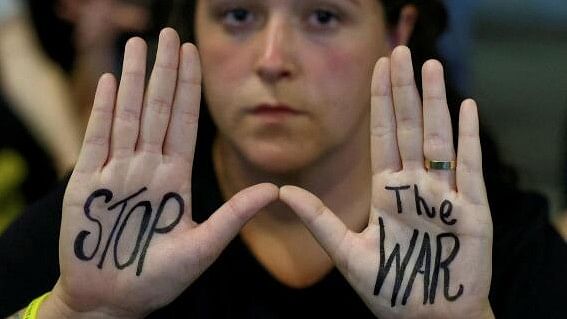
The families of hostages held in Gaza hold a silent protest to mark one year since the October 7 attack by Hamas during which their loved ones were taken hostage, in Tel Aviv, Israel, October 7, 2024.
Reuters
A year has gone by since the brutal attack by Hamas in Israel. In that terrorist strike, which caught Israeli intelligence and its defence forces by surprise, more than 1,200 people were killed. The number includes over 600 Israeli civilians, including women and children, 70 foreigners, and over 370 Israeli soldiers. Hamas took 250 civilians and soldiers hostage.
Until August this year, 120 of the hostages had been released after negotiations. Other than securing the release of Palestinians, including women and children in Israeli jails, in exchange for the hostages, what Hamas hoped to achieve with the attacks is unclear. The group, designated a terrorist group by many western countries, had once pledged the destruction of Israel, but signalled in recent years that it was willing accept the two-state solution with conditions.
Israel's expanded settlement strategy in the occupied areas, spearheaded by the extreme right-wing coalition of Prime Minister Benjamin Netanyahu, and designed to undermine the two-state solution may have been a trigger for the attacks. Hamas may have believed that it was an opportune time to strike.
Members of the Israeli security forces had come out openly against Netanyahu's attempts to take control of the judiciary, and massive anti-government protests had convulsed Israel in the months ahead of the attack. But the world rallied behind Netanyahu and Israel's “right to self-protection”. The consequences now before the world are surely not what Hamas anticipated.
Israel did not stop at “self-protection”. Its egregious war in Gaza, which began hours after the Hamas attack, has killed 42,000 Palestinians, half of them women and children, and has been ruled by the International Court of Justice as genocidal. Gaza, a narrow strip of land on the eastern coast of the Mediterranean Sea, which along with the West Bank constitutes the putative Palestinian State, has been bombarded beyond recognition. Its densely-packed 2.5-million population have been fleeing Israel's bombing campaigns from place to place.
It is unclear how much of Hamas, which ruled Gaza, survives. Israel assassinated Ismail Haniyeh, the Hamas political head, amid Qatar-brokered ceasefire talks. Netanyahu's turn north towards the Lebanon-based Hezbollah came after the militant group, an Iranian proxy, fired missiles into Israel in apparent retaliation for the Israeli assassination of its military commander Fouad Shukr in Lebanon hours before Haniyeh's killing in Iran. After attacking the group's communication network, Israel's September-end elimination of Hezbollah chief Hassan Nasrallah has revived Netanyahu's political fortunes. His mission creep from “self-protection” – in more than one sense of the word -- to genocidal war is now said to include a hubristic plan to engineer regime change in Iran.
Through this calamitous year, the US made no serious effort to stop Netanyahu. With its political class in presidential election mode, and President Joe Biden and the western world applauding the killing of Nasrallah, Netanyahu seems to believe that nothing can come in the way of his ambition.
For Iran, it is a moment of reckoning. Its domestic and external challenges are ironically coming together at a time that its people have voted in a moderate as its new president. Can it take on a belligerent Israel? And what would be the consequences? Israel's revenge for October 7, which turned into a long night for the Palestinians, now threatens the rest of the region. Netanyahu's expanding war cannot secure peace for Israel. It is, in fact, a threat to the whole world.